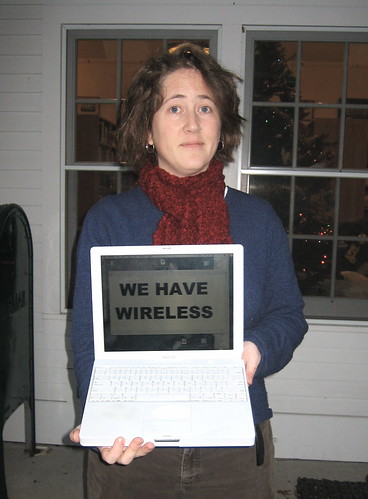I was reading American Libraries yesterday and enjoyed Andrew Pace’s column on the best of 2006 (eventually online here?). The short summary is that we’re seeing new degrees of openness from vendors as they attempt to deal with a bunch of librarian consumers-turned-creators asking for more and better ways to get at their data. The thing that I think is so neat about this is how far we’ve come in such a short time. Pace’s blog entry talks a little bit about Casey’s WPopac project and mentions how maybe we should toss the term OPAC since in 2006 it’s a little like saying “horseless carriage”
While I still work with libraries that have offline and card catalogs, I think it’s okay to say that they’re well behind the curve.
Other news in a similar vein is watching data get unearthed and made available. This can be bad like AOLs big dumb goof releasing their search queries but it can also be hot like watching torrents of library catalog data showing up online, only to mysteriously disappear. I’ve been keeping tabs on another big data project involving massive amounts of LoC data that I’ll post more about once it’s in a more polished form.
At the same time, I feel like we’re at a crossroads. Vendor-aligned people talk continually about how libraries’ adherence to strict privacy and data security methods are keeping us out of the social arena, keeping us from connecting with the Millennials who, we are told, don’t care about privacy. I had a long phone conversation with a researcher for a major library services vendor recently who was not-too-subtly drawing a distinction between privacy and trust relationships in libraries and privacy and trust relationships in social networks. I mentioned that despite their seeming ubiquity, social networks are far from achieving any sort of serious penetration where I live, even among Millennials. I asked what they were doing to ensure that their study included people who were actually not online, or socially networked. The response I got was not at all encouraging, in fact it was downright embarassing.
I think people flock to libraries and social networks as well as the best online casino real money apps for some of the same reasons. They’re free, they’re engaging, your friends are there. Libraries becoming more social seems to me to be a good thing. However I don’t think we have to do this at the expense of our core values, and I certainly don’t think we need someone to sell social back to us. The great thing, the truly wonderful thing, about all this new openness is that it creates choices for us, as libraries and as librarians. Those choices, unlike our past choices, don’t need to lock us into some terrible marriage with someone who does not have our best interests at heart and that is a wonderful thing. Andrew thanks, among other people, the complainers who have been agitating for better things all this time. So for me and all my other grouchy compadres, I’d like to say both “You’re welcome.” and “There is still work left to be done.”
